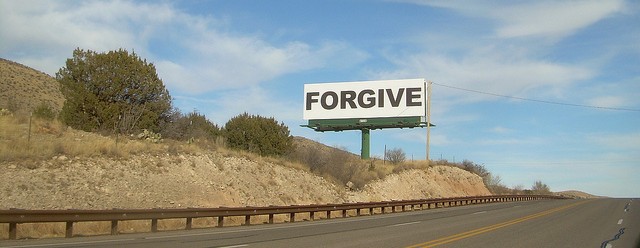
“It is easier to forgive an enemy than to forgive a friend.” – William Blake
We’ve all heard the admonition to forgive and forget.
But there are two schools of thought on the subject. Some urge us to clear the slate and forget the wrongs for the sake of our own peace of mind and spiritual health. They say forgiving is not really forgiving until we’ve forgotten.
“Forgive, forget. Bear with the faults of others as you would have them bear with yours.” ~Phillips Brooks
Others warn of the dangers (not to mention the impossibility) of forgetting the sins of those who have offended, lest we become their unwitting dupes and set ourselves up for a repeat performance.
“Forgive your enemies, but never forget their names.” ~JFK
But what are we really being asked to forget?
Seldom is that question ever asked (or answered), which often leaves us trying to accomplish the impossible, feeling guilty that our memories have not somehow been adequately erased?
The truth of the matter is that the mind records all it experiences. Add sharp emotion to the offense, and you have a recipe for an elephant-like memory of the nitty gritty.
This begs the question: Can others’ offenses truly ever be forgotten? The simple answer is not likely. So in that light, what could the admonition to forgive and forget even mean?
I like to think of it this way…
“Bow your head”
Have you ever attended a funeral service where the officiator asks those in attendance to “remember” the life of the deceased? I’m sure you’ve heard a voice over an intercom system at some point in your life ask you to bow your head in memory of the fallen in a moment of silence.
What are they really asking you to do?
I think what they mean on those occasions is to reflect for a moment on the life of the person. Remember them in your heart. Let their works and deeds sink down into your soul and be filled with appreciation for them and inspired by them. We’re being asked to keep them alive inside, carrying them with us.
If that’s the case, then remembering the trespasses and offenses against us would be a similar act. It would include letting the offense sink deeply into our soul, keeping it at the forefront of our mind, obsessing over the memory of what was done to us, nurturing the wound, reminding the offender of the offense, carrying it inside, feeding it, expanding it, picking at it, never letting it wander too far away from our hearts.
Is that Forgiveness?
But then does forgiveness mean we invite the verbal abuser, cheater or chronic liar back into our lives, become best friends or have them babysit our kids?
No, I don’t think so.
Maybe forgiving and forgetting doesn’t mean to pretend like the thing never happened. Perhaps it really has nothing to do with literally forgetting or acting as though we forgot the misdeed.
Maybe, instead, it means letting go of the hurt, releasing the pain, treating the person like they have a second chance, like the slate has been cleaned, the ledger cleared, the scoreboard of their lives reset, a new page turned for them to rewrite what they once wrote in uglier prose, free of the weight of our hatred.
Maybe it’s a way of allowing another to clean the mess and move on unhindered by the weight of our memories, dragging them back to the scene of the crime in an endless loop of anger, accusation and offense.
Maybe it’s a way of honoring ourselves as well by refusing to let the poison of hatred and blame continue to eat at the fiber of our own hearts and souls.
An Investment
And just maybe it’s also an investment of sorts in our own future need for others to exercise the magnanimity necessary to extend a forgetful forgiveness to us one inevitable day as well.







































Hi Ken,
I think you’re right, we don’t forget. Maybe the point is not whether we remember the details of what happened, but whether we understand the lesson we learned about ourselves from it. I think everyone in our lives has something to teach us about ourselves, whether they consciously know it or not – even people who wrong us.
The challenging part is focusing on looking past the wrong to look for the lesson. If we can find it, and take that with us instead of the details of what happened, then it’s ultimately a win win for all, regardless of what happened.
In a way, forgiving is “for giving” to ourselves.
Larry
Larry Phillips recently posted … Energetic Balance Creates Health
I like that way of looking at it, Larry. That IS the point. Life’s experiences are designed to point us in the direction of growth. We are in school, learning and stretching and becoming something a little closer to the potential inherent in the nature of who we are. So when others step on our toes or bloody our hearts, we have the opportunity to sink to the level of pain and suffering or rise to the dizzying heights of forgiveness and a peace-filled heart that simply accepts and loves. The difference between the two in quality of life can’t be further apart than night and day.
Love this line: “IN a way, forgiving is ‘for giving’ to ourselves.” Nicely said, Larry!
Hi Ken, I really love reading your post. I know it is hard to forget people who treated any of us badly, or worst, people who made our lives miserable but you are right ” it means letting go of the hurt, releasing the pain, treating the person like they have a second chance, like the slate has been cleaned, the ledger cleared, the scoreboard of their lives reset, a new page turned for them to rewrite what they once wrote in uglier prose, free of the weight of our hatred” , that way , we learn to move on and have a fresh start. Thanks for sharing a great post.
My pleasure, Lynne! Thank you for sharing your thoughts.
Forgiveness can be one of the most difficult personal development hurdles to overcome if there’s someone in our lives (or our past) that has deeply hurt us, especially if it happened over a long period of time and especially if we feel that our lives are still being hurt by the insecurities and other issues that may have been born out of the damage the person inflicted.
But like you say, it’s the only way to move on and be rid of the extra weight we otherwise walk through life with when we hang on to the hate and bitterness. Ultimately, we suffer most when we don’t let it go, right? But when we do, something deeply burdensome is lifted, peace returns and the channels to happiness are opened to a degree impossible until we forgive.
So glad the post resonated with you, Lynne.